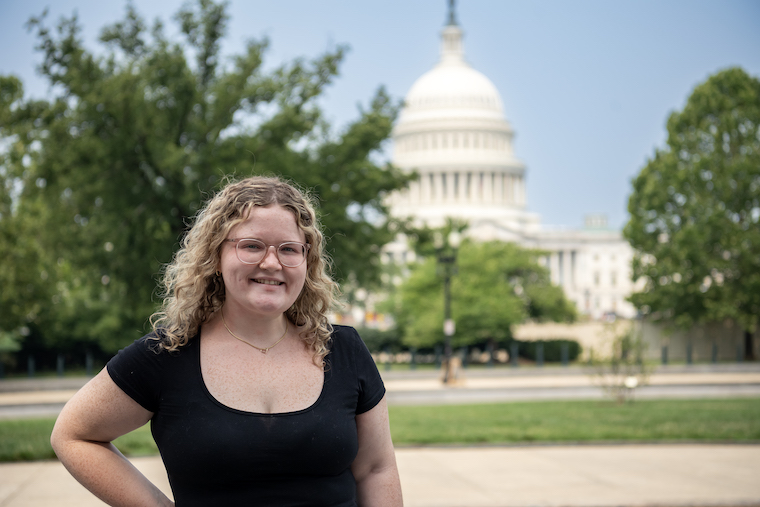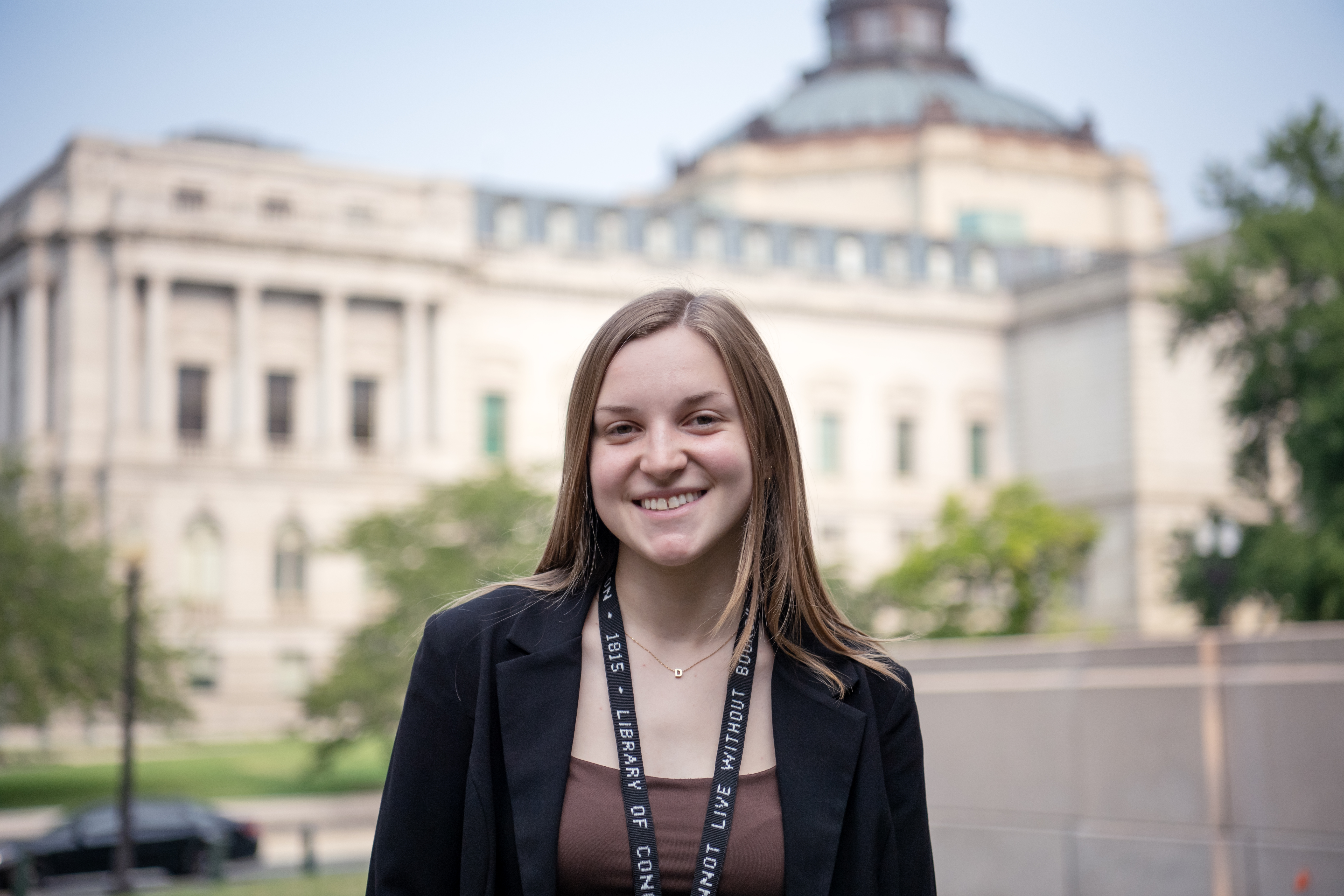Capital Access
Washington College students are leveraging opportunities in D.C. to build skills and drive real-world change.

At Washington College students aren't just reading about policy and government—they're shaping it. By turning the nation's capital into a real-world classroom, the College—located just an hour and a half from Washington D.C.—is giving students a direct, hands-on path to better understand, and influence, the politics that drive our nation. More than just field trips, the College offers ongoing opportunities for students to become active participants in the legislative process, from lobbying on Capitol Hill to interning in the heart of federal agencies. It's a bold approach to education, preparing a new generation of leaders to do more than just observe—it's preparing them to act and serve.
Inside the Beltway
Every spring, students across the country trade their textbooks for briefcases and take the steps of the Capitol Building for Spring Lobby Weekend, an annual event organized by the Friends Committee on National Legislation (FCNL). This year was Washington College's third time participating.
"The goal is to empower young people with the skills and knowledge to be citizen lobbyists so they can make their voices heard about the issues that matter to them," says Emily Steinmetz, associate professor and chair of anthropology & archaeology. Steinmetz co-directs the annual trip for Washington's students alongside Carrie Reiling, associate professor of political science & international studies. Students come from a broad range of majors and academic interests. For many, the experience is a profound realization.
"One thing that Carrie and I both love to see is the realization from our students that congressional representatives work for them," Steinmetz explained. "As constituents, we have the right to share our concerns and perspectives. We can expect our representatives (or their staff) to meet with us and listen to what we have to say, and we can meet with them as often as we want to."
And their efforts pay off. FCNL staff have seen firsthand how the students' advocacy has made a difference, noting that after the 2023 and 2024 lobby days, they saw representatives changing their vote on key issues and/or becoming co-sponsors of bills.
The 2025 cohort included 13 Washington students who received training on how to effectively communicate with congressional offices. Their issue was preventing cuts to Medicaid and SNAP during budget reconciliation. Students were fully engaged with the topic.
"They took the issue seriously. They did additional research to find out the ways that Medicaid and SNAP affect their own families, their neighbors, and their communities. They practiced and prepared in advance of the lobby visits,” said Steinmetz, who noted that she and Reiling were proud of the group's dedication, even though this past year was "much more politically polarized than ever."
For many, the experience was a revelation. Environmental science major Mia Snyder '26 , hopes to pursue a Master of Public Health program in epidemiology after graduation next year and saw examples of how she wants her education to affect real-world situations.
“Lobby Weekend got me more invested in fighting for and securing the safety of communities that I had not been a part of due to my privilege, which is something I want to continue doing through informing legislation with environmental-epidemiologic studies,” she said. “All of the tactics we learned such as identifying trigger words, how to approach indifference, directing conversations with staffers, and leading with empathy, are all things I know I can use to help inform policies that will positively impact the overburdened communities that need it most.”
Snyder also admitted the weekend changed her perspective on government workers, saying she went into the weekend with a jaded view of the profession but gained a new respect for the dedication and passion required for the work after connecting with her representatives' staffers.
For Ashna Symes ‘28, the power of grassroots advocacy was the most enlightening aspect of the Lobby trip.
“Seeing so many passionate individuals come together, share their stories, and push for meaningful change was incredibly inspiring,” Symes said. “One of the most memorable moments was when we had the opportunity to meet directly with our representatives. It was eye-opening to witness the impact we could have by sharing our experiences and urging them to support important legislation. That sense of collective purpose and determination was truly motivating and reinforced my belief in the importance of civic engagement.”
Beyond Lobbying: Launching Careers in D.C.
Weekend trips are just a portion of the opportunities Washington students have to gain insights and influence in the nation's capital. The Starr Center for the Study of the American Experience offers its Explore America Summer Internship Program, providing fully paid summer internships in D.C. and other major cities. These internships place students directly in the heart of government and policy, offering a significant launchpad for future careers. The latest program cohort included 25 students who interned at prestigious organizations and governmental offices. Past placements have included the National Archives, Smithsonian museums, the Library of Congress, and the U.S. House of Representatives.
The College also partners with The Washington Center to provide another pathway for students to intern in D.C. Through this program, students can attend hearings, conduct policy research, draft correspondence, monitor legislation, lobby members of Congress, or write analytical reports.
Political science and international studies professor Andrew Oros noted that offering students the opportunity to meet with people who are involved in the policymaking process can bring to life challenges real people face in implementing our democracy. He has also taken students to the capitol numerous times over the years.

“In teaching about American foreign policy, I have brought students to the West Wing of the White House, where Washington College alumni have worked, as well as to numerous think tanks and advocacy organizations to illustrate different aspects of the policymaking process,” he said. “We also have visited with researchers at the non-partisan Congressional Research Service as well as various foreign embassies to hear their differing perspectives.”
Oros highlighted that Washington students have frequently interned with members of Congress, for advocacy organizations, and in think tanks like the Brookings Institution, Heritage Foundation, and East-West Center. Those experiences, he said, can create a direct pathway to future employment or simply offer experiences to allow for greater direction for next career steps, including graduate study.
“In addition, our robust alumni network of members of the Goose Nation working in Washington helps our students to connect to career positions or complete informational interviews to consider future career paths based in our nation's capital," he said.
Empowering the Next Generation
By putting students in the rooms where policy is made and history is preserved, Washington College ensures its graduates don't just leave with a degree. They leave with the practical skills and civic confidence to become engaged, effective leaders in their communities and the world.
To find out more about our vision to create and empower the next generation of emerging citizen leaders to discover lives of purpose and passion, visit our Mission page.
- Dominique Ellis Falcon